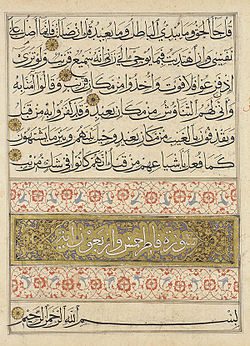
(Wikimedia Commons public domain image)
We’ll now proceed to examine some of the teachings of the Qur’an in detail.
Dispensations
The Qur’an clearly and repeatedly teaches a dispensational view of the earth’s religious history, in which there have been repeated revelations of God’s truth and repeated human apostasies from that truth that required it to be restored again. There was a time, it says, when men followed a single religion. But then discord arose.[1] God tried to remedy this situation. Every nation has had a messenger from God who warned it of its sins and attempted to teach it the truth.[2] “Your Lord will not destroy a nation without just cause and due warning.”[3] Thus, the ancient ruins that dot the Near East are regarded by the Qur’an as symbols of the justice of God and as warnings against neglecting the message of his prophets:
How many a city We have destroyed that flourished in insolent ease! Those are their dwelling-places, undwelt in after them, except a little; Ourselves are the inheritors. Yet thy Lord never destroyed the cities until He sent in their mother-city a Messenger, to recite Our signs unto them; and We never destroyed the cities, save that their inhabitants were evildoers.[4]
“Every age has its scripture,” the Qur’an informs Muhammad.[5] “We have sent forth other Messengers before you; of some you have already heard, of others We have told you nothing.”[6] Specifically listed with the Qur’an itself among the revelations of God to man-kind are the Torah and the gospel.[7]
The Torah was “a guide and a mercy” to mankind when it was revealed.[8] It continues to have religious value even today:
There is guidance, and there is light, in the Torah which We have revealed. By it the prophets who surrendered themselves [aslamu] to God judged the Jews, and so did the rabbis and the divines; they gave judgement according to God’s scriptures which had been committed to their keeping and to which they themselves were witnesses.[9]
Yet the Jews themselves, in the view of the Qur’an, have proven unworthy of the blessing that was entrusted to them. “Those to whom the burden of the Torah was entrusted and yet refused to bear it are like a donkey laden with books” that he does not understand.[10] The Jews broke the covenant of Sinai, denied God’s revelations, and killed His prophets unjustly.[11] Because they broke their covenant, God cursed them and hardened their hearts. “They have perverted the words of the Scriptures and forgotten much of what they were enjoined.”[12]
[1] 10:19.
[2] 10:47; compare 16:36; 17:13-14; 26:208-9; 35:24.
[3] 6:131.
[4] 28:58-59 (Arberry); compare 30:9; 35:44; 40:21-22, 82-83; 54:51.
[5] 13:38.
[6] 40:78.
[7] 9:111.
[8] 46:12.
[9] 5:44.
[10] 62:5.
[11] .3:187; 4:155; 5:12-13.
[12] 5:13. Compare 2 Nephi 10:3-6 and many other passages in the Book of Mormon and the New Testament. The supposed “anti-Semitism” of the Qur’an is much like that of Jesus in the gospels.












